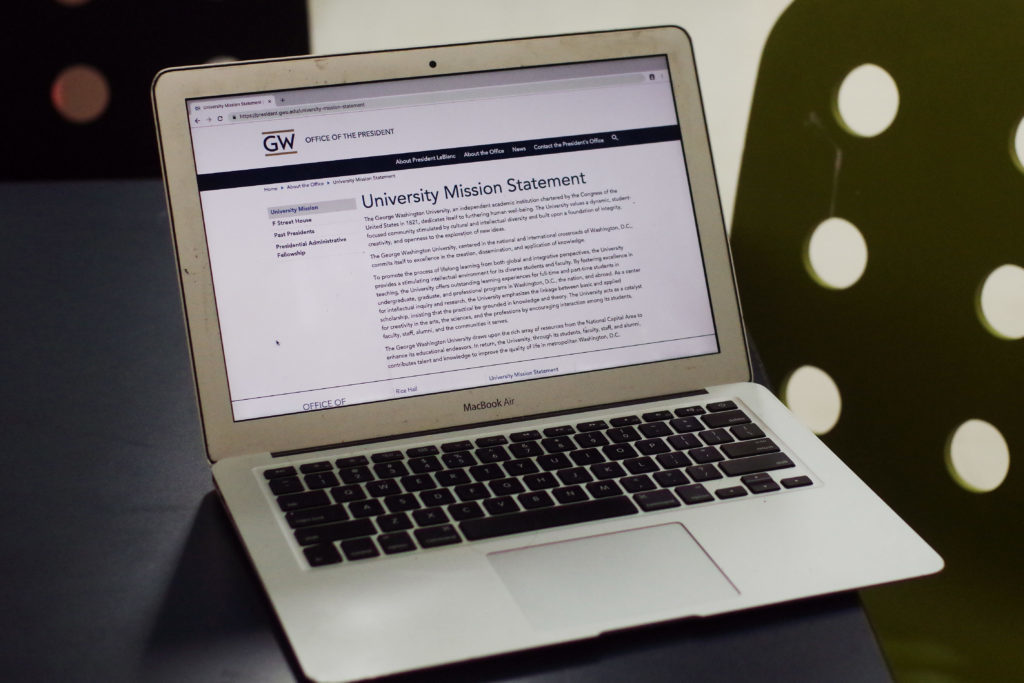The Board of Trustees is planning to review the statement that dictates GW’s goals and purpose.
Nelson Carbonell, the chairman of the Board of Trustees, said the board is looking into revamping the mission statement to be shorter and more precise, which he said may not include “everything we do here at GW.” He said the governance and nominations committee will tackle the review this year as part of the board’s regular three-year review of its bylaws.
“I believe it’s important that we are always mindful of our mission, and that includes reviewing how we define it and how we pursue it,” he said in an email.
Carbonell said it “made sense” to review the mission statement this year after the University finished its reaccreditation process, which occurs roughly every decade and ensures that GW is living up to higher education standards. He said the Middle States Commission on Higher Education, GW’s accrediting body, “highlighted the need to review and refresh” the statement.
While the commission commended GW’s “clearly and distinctly” defined mission statement, the group also suggested that officials update the University’s strategic plan and mission as University President Thomas LeBlanc, who stepped into his role last year, translated his priorities into action items.
“We are looking at returning to something simpler,” Carbonell said. “They felt we should make sure the mission was achievable.”
GW’s current mission statement, which clocks in at 238 words, commits the University to promoting cultural and intellectual diversity and exploring new ideas and knowledge. The statement highlights the University’s commitment to provide a “stimulating intellectual environment” for students and faculty in the District, nationwide and abroad.
The statement also notes GW’s commitment to create research “grounded in knowledge and theory” and to promote creativity in the arts and sciences. The mission also touches on GW’s relationship with the D.C. community, saying the University “draws upon the rich array of resources from the National Capital Area to enhance its educational endeavors.”
“In return, the University, through its students, faculty, staff, and alumni, contributes talent and knowledge to improve the quality of life in metropolitan Washington, D.C.,” the mission states.
Carbonell said that even though he believes GW does improve life in the District, it is challenging to include the obligation in the mission statement because the commitment is broad.
Carbonell said the board would update community members as the review process progressed but he declined to say who will provide input for the statement and why. He declined to say what specific areas of the mission statement he felt were dated or not relevant.
He also declined to say how officials will evaluate how the mission statement reflects what GW does and when officials will make a decision about the mission statement.
Among GW’s 12 peer schools, 11 mission statements did not stress the importance of bettering the city in which the university is located. The University of Southern California’s mission statement notes the school’s “major role in the development of southern California,” which the statement says it plans to continue “for many centuries to come.”
Georgetown University – one of GW’s peers – does not mention the District in its mission statement, while American University, which is not a peer institution, notes that the school aims to take “full advantage of the resources of the Washington, D.C., metropolitan area.”
Some of the most common phrases in mission statements at GW’s peer schools include an emphasis on shaping students to become independent thinkers, increasing diversity and connecting students and faculty.
Anthony Yezer, a professor of economics, said GW’s mission statement is general to embody the central ideals of “teaching, research and service” that stand at the core of the University. But he said faculty do not usually conduct their teachings and methods by directly following the mission statement.
“When we recruit faculty to the University – we don’t recruit them based on the mission statement,” Yezer said. “We recruit them based on what we’re doing here in this department.”
Michael Massiah, a chemistry professor, said he thinks the current mission statement’s goal to improve the lives of people in D.C. is achievable and does not need to be changed.
“The mission is not just to educate but to prepare a human being to take that knowledge and apply it,” Massiah said. “And I believe that’s a good mission and it’s something we clearly strive for and we’re successful for.”
He added that the mission should be more global-focused than just noting that the University aims to improve the quality of life in D.C. because extending GW’s international hand could ensure the University has a wider impact on academics around the world.
LeBlanc, the University president, has long said that GW should work to establish itself as an international research institution. This year, GW cracked the Times Higher Education list of the top 200 global universities for the first time in four years.
Harvey Feigenbaum, a professor of political science and international affairs, said the mission statement is “something to remind people at GW who we are.”
“The mission statement doesn’t need to be read by people in GW for them to act in ways that are completely in accord with the mission statement,” Feigenbaum said. “The mission statement reflects the University – it doesn’t necessarily guide it.”





